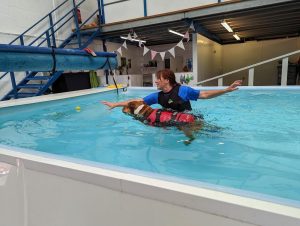When our beloved dogs experience pain, particularly from musculoskeletal problems, it’s natural to want to provide them with immediate relief. Nonsteroidal anti-inflammatory drugs (NSAIDs) such as Metacam, Rimadyl, or Carprieve are commonly prescribed by vets to alleviate pain and reduce inflammation. While these medications can be very effective, they may not always be the best long-term solution.
Here’s why consulting a veterinary physiotherapist might be a better choice for your dog’s health and well-being.
Treating the Root Cause, Not Just the Symptoms
NSAIDs work by reducing inflammation and pain, offering quick relief. However, they don’t address the underlying causes of conditions such as arthritis, joint dysplasia, or soft tissue injuries. A veterinary physiotherapist takes a holistic approach, focusing on the root of the problem through a combination of therapeutic exercises, manual therapy, and lifestyle adjustments.
Example: If your dog has arthritis, physiotherapy can help strengthen the muscles around the affected joints, improving stability and reducing pain without solely relying on medication.
Minimising the Risk of Side Effects
While NSAIDs can be effective, long-term use can lead to potential side effects such as gastrointestinal problems, kidney or liver damage, and even decreased joint health over time. For dogs with pre-existing conditions, these risks are even greater. Physiotherapy, by contrast, is a non-invasive treatment that doesn’t pose a risk to your dog’s internal organs, making it a safer option for long-term care.
Improving Mobility and Quality of Life
Veterinary physiotherapy goes beyond simply managing pain. Through targeted exercises and techniques such as hydrotherapy, laser therapy, and massage, a physiotherapist can improve your dog’s range of motion, muscle strength, and overall mobility. This not only helps to reduce pain but also enhances your dog’s ability to engage in everyday activities, significantly boosting their quality of life.
Example: A dog recovering from cruciate ligament surgery can benefit from a structured physiotherapy programme to rebuild muscle strength and joint flexibility, reducing the likelihood of future injuries.
Personalised, Tailored Care
Every dog is unique, and their treatment should be too. Veterinary physiotherapists create bespoke rehabilitation plans based on your dog’s specific condition, age, breed, and lifestyle. This personalised approach ensures that your dog receives the most effective treatment possible, something that medication alone cannot offer.
Long-Term Cost Savings
While physiotherapy might seem like a significant investment upfront, it can lead to long-term savings. By addressing the root cause of pain and preventing further deterioration, physiotherapy can reduce the need for costly surgeries, frequent vet visits, or long-term medication use. For dogs with chronic conditions, the cumulative cost of NSAIDs and their potential side effects can far exceed the cost of a physiotherapy programme.
Supporting Post-Operative Recovery
If your dog has undergone surgery, physiotherapy can be an invaluable part of the recovery process. It helps reduce post-surgical pain, improve healing, and restore function more quickly than medication alone. A physiotherapist can guide you through the appropriate exercises and techniques to ensure your dog’s recovery is as smooth and effective as possible.
Preventing Future Injuries
Physiotherapy not only treats existing conditions but can also play a preventative role. Strengthening muscles, improving coordination, and maintaining a healthy weight through guided exercises can reduce the risk of future injuries and degenerative conditions—something NSAIDs alone cannot achieve.
When to Use NSAIDs
NSAIDs do have their place in veterinary medicine. They can be essential for managing acute pain and inflammation, especially in the early stages of an injury or during flare-ups of chronic conditions. However, they should be seen as part of a comprehensive treatment plan rather than a standalone solution.
A Combined Approach for Optimal Health
While NSAIDs can provide necessary pain relief for your dog, they are not a complete solution. Veterinary physiotherapy offers a more comprehensive, holistic approach to managing pain and improving overall health. By incorporating physiotherapy into your dog’s care plan, you’re not only addressing their immediate discomfort but also investing in their long-term well-being and happiness.
If your dog is experiencing pain or mobility issues, consider consulting one of our veterinary physiotherapists. They can work alongside your vet to create a balanced, effective treatment plan that prioritises your dog’s health and quality of life over the long term.













